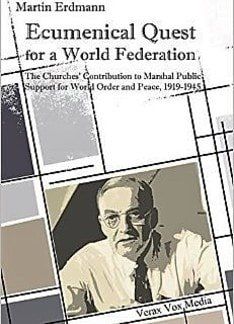This is an excellent work, which informs us of the past and gives us much to consider for the future. Erdmann writes of the era when World War I was approaching and a number of influential people gave thought to what could possibly abolish war and solve most of the world’s social ills.
Following the Great War, it was determined by many that only a ‘new world order’ could accomplish such a feat. With the signing of the Treaty of Versailles, many felt the seeds for the next world war were planted and, as the next 20 years demonstrated, they were correct.
Something had to be done about war and its lasting devastation. A new world order was urgently needed, but standing in its way was the issue of nationalism. John Foster Dulles, the principal mover behind the new world order, believed the ‘solution [lay] in the abolition of the entire concept of national sovereignty and the unification of the world into a single nation. All boundary barriers are thus automatically levelled’ (p.115).
Leading the charge in establishing such a world order would have to be Great Britain. The British Empire had the most ‘excellent and refined qualities of humankind’ (p.53), and ‘British imperialism and the spread of social welfare were fundamental to the continuous existence of the British way of life’ (p.53).
If a new world order was to be established, the British Empire, along with the United States, would have to lead (pp. 45-47, 77-84); nationalism would have to be abolished and a world commonwealth would have to be established, a commonwealth which would unite the nations of the earth into a confederacy similar to the design used in establishing the United States (pp. 95-101).
However, politicians and governments could not accomplish this goal alone; something even more powerful was needed: the church. If the church could be convinced that by creating a new world order in which war, poverty and injustice were eliminated, and that they were also ushering in the kingdom of God, then the church would gladly join hands with politicians to bring about such a world society.
It was Dulles’ goal ‘to motivate the churches to become actively involved in building a global society’ (p.119; see also pp. XII, 86-87). The Federal Council of Churches (FCC) was on board, as became clear in their Social Creed of 1932. One leader stated: ‘We are coming to see that the kingdom of God in Christ’s conception never means anything less than a righteous human society…
‘He has come, not alone to save people out of the world and fill them for a far-away heaven, but to make a heaven here. He has come, not to patch up human society and make the world a little less intolerable for men, but to make all things new and create a new social order’ (p.208).
By downplaying doctrine (p.418) and ‘applying the principles of socialism … the kingdom of God on earth would be set up according to the ecumenical ideal’ (p.419). The kingdom of God, having been stripped of all biblical and theological distinctives, now was virtually identical to the new world order and its political and social agenda.
But just as national sovereignty was a detriment to a new world order, so too an exclusivist Christianity would deter the coming of the kingdom of God. It was therefore necessary to recognise that ‘the moral, or natural, law is revealed through other religions, and can be comprehended by all men, so that it is a force far more universal than any particular religion’ (p.189).
Since dogmatic beliefs were incompatible with ecumenical unity, they were laid aside in favour of the social gospel, as expressed in the Social Creed of 1932. The true mission of the church, according to the FCC, was to build the kingdom of God on earth (pp. 195, 197, 202-203, 213). Saving of souls from sin was replaced with saving the world from war, poverty, unemployment and injustice.
In order to accomplish this, the world religions would have to be involved, but, just as Britain and America led the political charge, so too Christianity would lead the religious charge.
Thus, between the World Wars, a liberal, postmillennial view of the kingdom of God dovetailed with a political push for a new world order. This led to the formation of the World Council of Churches in 1943, to build God’s kingdom through the social gospel (p.387). On the political front, the United Nations Organisation was formed in 1945, to bring about a one-world government (pp. 404-406).
The ambitious goals behind these two organisations have never been realised, although they continue to be the heartbeat of many political and religious leaders. Most recently, within Christianity, the Emergent Church movement has re-energised the postmillennial, liberal attempt to establish the kingdom of God on earth through a social agenda.
Using virtually the same verbiage, methods and propaganda, emergent leaders are indoctrinating a whole new generation with an unbiblical understanding of the kingdom of God and the mission of the church. To read Erdmann’s book is to be forewarned of what is transpiring today.
Ecumenical quest for a world federation is an excellent historical study of all the events described above (and much more) during the first half of the twentieth century. It is a scholarly work, with extensive footnotes for the researcher. The book will inform you of the past and prepare you for the present and future. I recommend it highly.
Gary Gilley
Springfield, Illinois
Editor’s note: This book’s first edition was published under the title Building the kingdom of God on earth.



